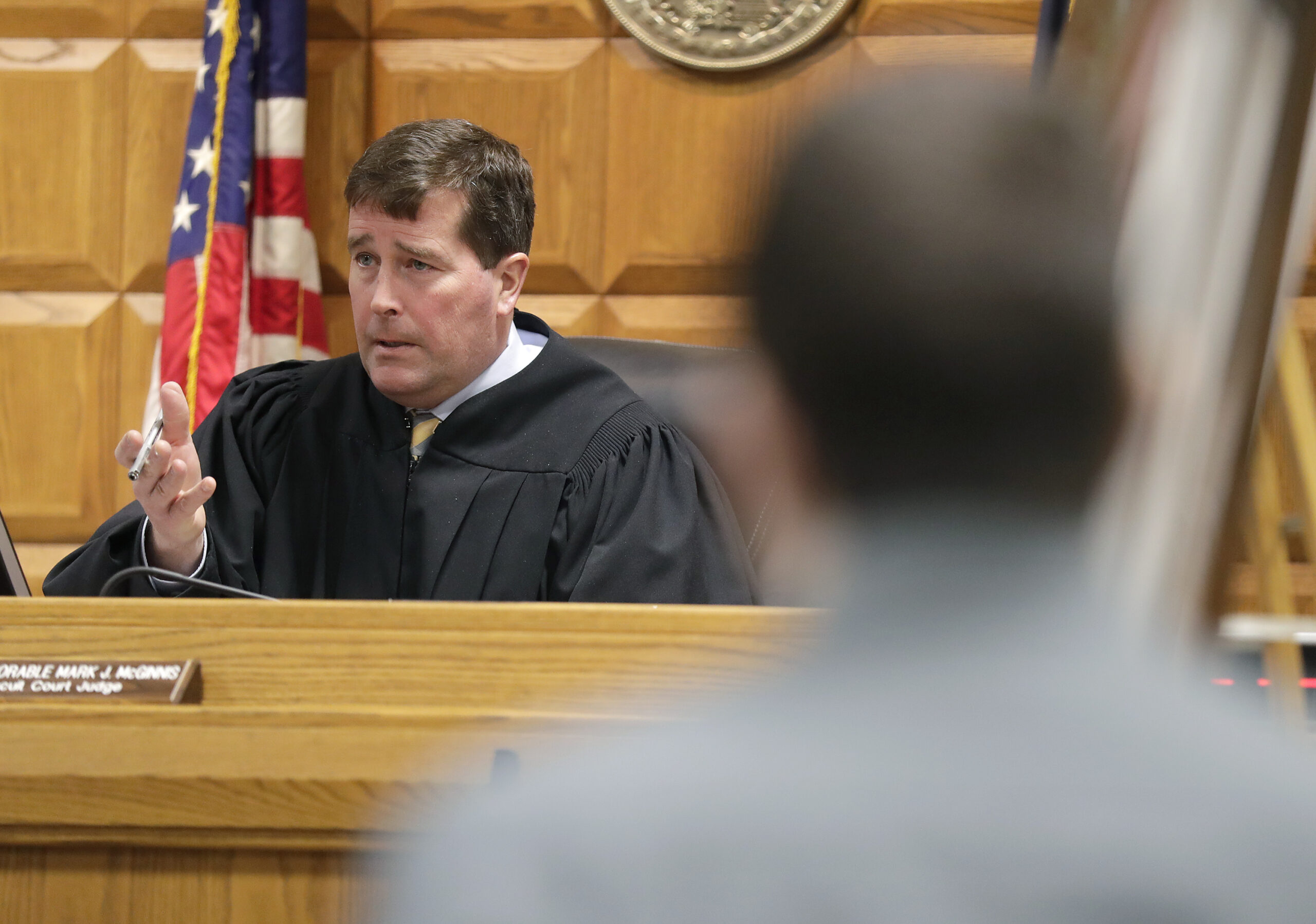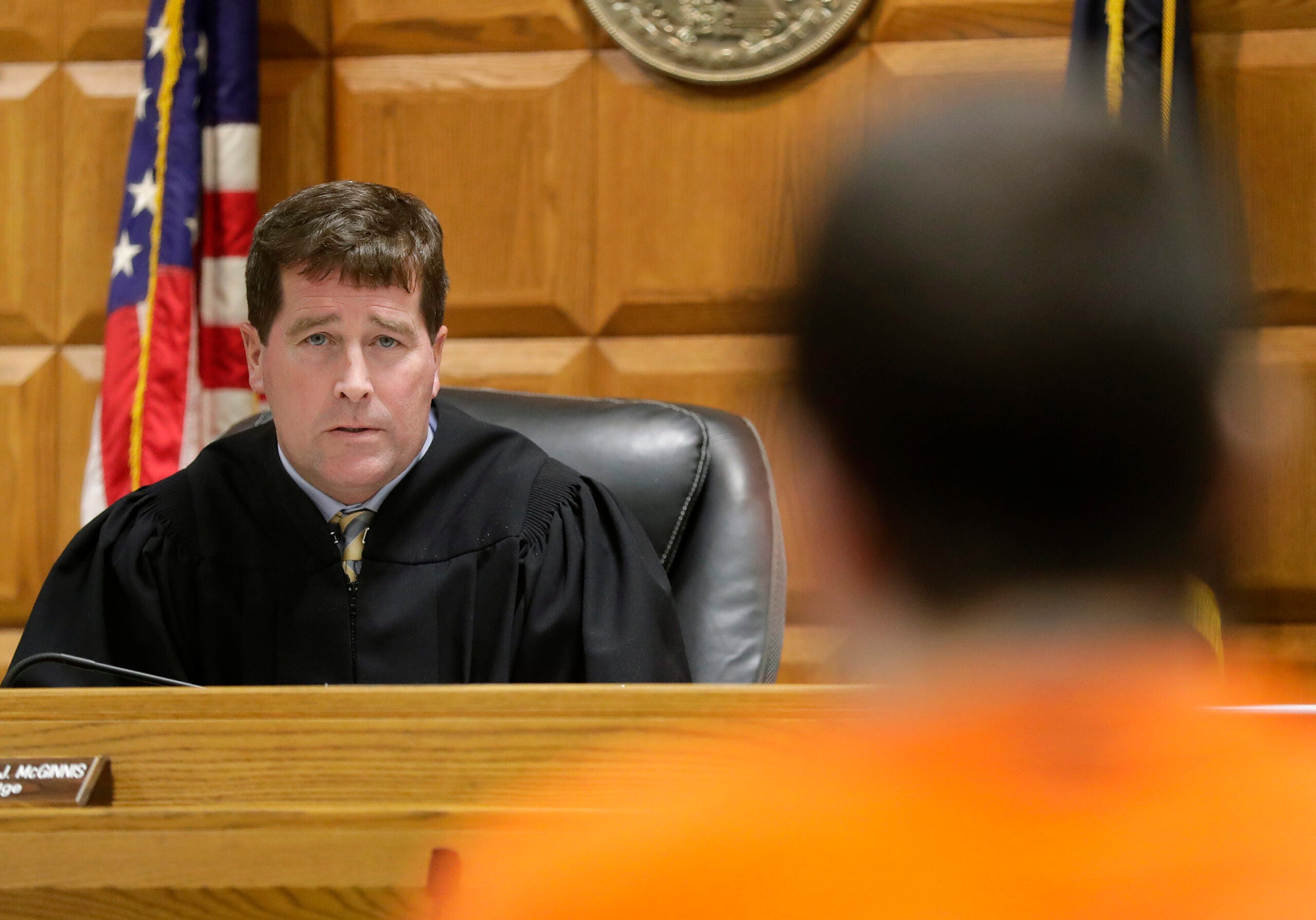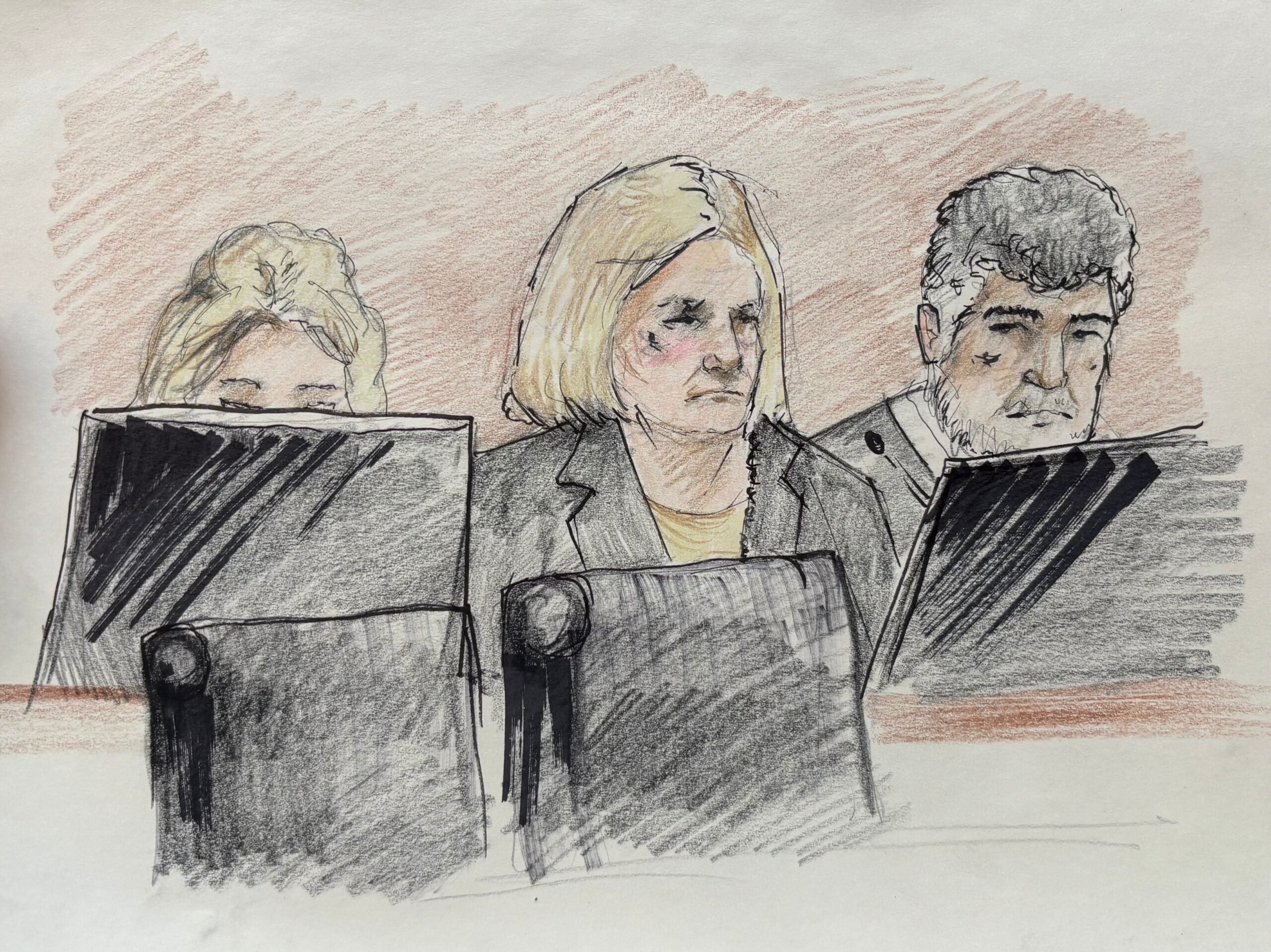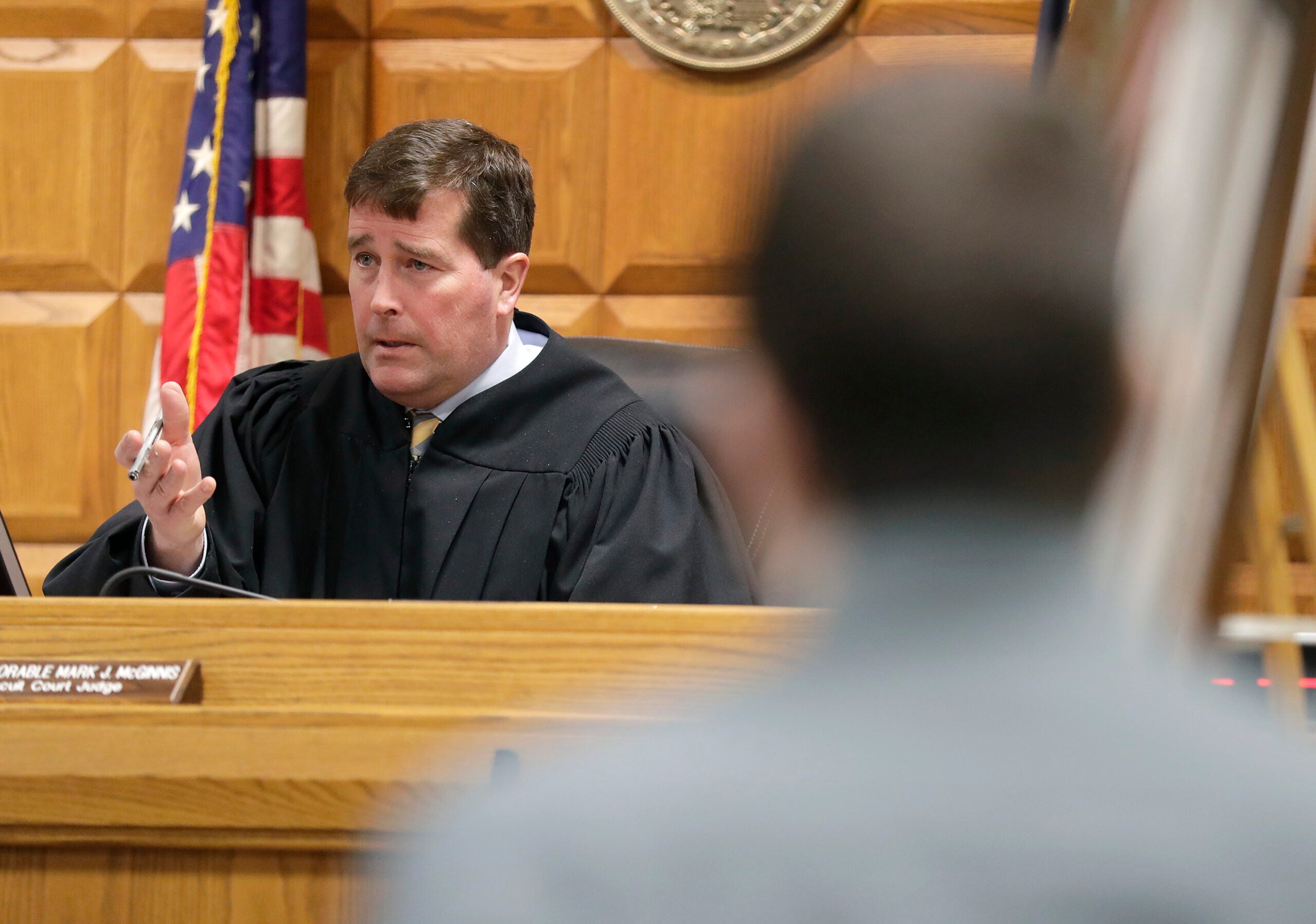This story was originally published by Wisconsin Watch.
An Outagamie County judge is under state investigation after he briefly jailed a criminal defendant over an unrelated financial dispute with a courthouse employee in 2021.
Judge Mark McGinnis’ courtroom tactics have come under scrutiny several times since he was first elected in 2005. But legal experts say the latest episode likely exceeded the judge’s legal authority.
News with a little more humanity
WPR’s “Wisconsin Today” newsletter keeps you connected to the state you love without feeling overwhelmed. No paywall. No agenda. No corporate filter.
During an unrelated felony probation hearing, McGinnis ordered a Hortonville contractor be sent to jail for 90 days unless he repaid a deposit on a cement job he started but delayed because the ground had frozen at the courthouse employee’s lakefront cabin in Oneida County.
“You do know that my wife works for a judge,” the courthouse employee’s husband texted the contractor after demanding most of a $7,000 deposit be returned immediately.
Public records show the contractor, Tyler Barth, faced no formal complaints related to the cement job at the time of the hearing, raising questions as to how the judge knew about the dispute. A local defense attorney helped get Barth out of jail within a few days, then notified the local district attorney.
The Department of Justice confirmed the existence of an investigative file in response to a Wisconsin Watch records request. State investigators interviewed the contractor and the defense attorney more than a year ago, but no charges have been filed and DOJ declined to comment.
John P. Gross, director of the Public Defender Project at University of Wisconsin Law School, said it’s unclear what the legal basis was for the judge jailing the defendant.
“You are entitled to a hearing on whether or not you did, in fact, violate the terms and conditions of your probation,” said Gross, who reviewed the transcripts. “But that didn’t happen here.”
Barth’s ordeal is only the latest in a series of documented missteps and alleged overreach by McGinnis. Yet to date, the judge has faced no public consequences for his actions.

A reputation as a tough judge with polarizing style
In Wisconsin, circuit court judges run for six-year terms in spring nonpartisan elections. But no one has challenged McGinnis since his first election at age 34. He didn’t respond to Wisconsin Watch’s interview requests.
A complaint alleged McGinnis skirted state ethics law in years past by not disclosing income he received for legal training sessions for Appleton police officers. Records published by Wisconsin Watch in 2015 show that between 2007 and 2011, he billed the city of Appleton $18,450 for scores of half-day legal trainings at $450 a session.
McGinis’ business relationship with the state probation department also has come under scrutiny. After prevailing in a lawsuit from former business partners, he came into sole ownership of an office building in Grand Chute. He arranged a multimillion-dollar deal with the state Department of Corrections to house its probation department in 2008.
The Post-Crescent obtained internal agency emails showing DOC attorneys called the $2.7 million 15-year lease “problematic.” The judicial code of conduct prohibits judges from having a business relationship with entities that come before the court. McGinnis said the Wisconsin Judicial Commission provided ethical guidance that OK’d the deal.
The commission denied a records request for its ethical guidance, citing confidentiality of its proceedings. The lease was renewed last May and could be worth as much as $4.4 million through 2042.
In 2009, McGinnis was instrumental in creating a Truancy Court for the Appleton Area School District to deal with chronic absenteeism in secondary schools. But the decade-long experiment ended in 2019 following an external review commissioned by the school district.
“The judge has bullied students who do not communicate easily and their parents,” Madison attorney Duane McCrary wrote in the review. “When parents or attorneys try to explain, he shuts them down.”
A 2015 Post-Crescent investigation found that over a four-year period, McGinnis led the state in substitutions — 1,130 requests by defense attorneys that he be replaced by another judge in felony cases, which was triple the volume of any other circuit court judge in Wisconsin.
McGinnis’ rulings have also been overturned by higher courts for exceeding his sentencing authority. In 2009, an appellate court admonished McGinnis for being “objectively biased” after he threatened a defendant with maximum sentencing if the man violated his probation.

Judges given broad immunity by highest court
The U.S. Supreme Court has given judges almost blanket immunity for their official actions on the bench. Higher courts can overturn a decision when a judge fails to follow the rules, but judges rarely face sanctions for exceeding their authority.
In Wisconsin, removal of a judge requires the Wisconsin Supreme Court to act on a complaint-driven recommendation from the Wisconsin Judicial Commission, a mixed panel of appointed lawyers, judges and non-lawyers. Other methods include a public recall and removal by the Legislature via impeachment or address.
The last circuit court judge to be removed was in 1985. Rusk County Circuit Judge Donald J. Sterlinske had been accused of a string of improprieties from falsifying court records to settling personal scores from the bench.
“He had a little fiefdom in that county, and he was used to getting whatever he wanted by saying he was the judge,” said Jim Doyle, who prosecuted the case before going on to serve as attorney general and governor.
In decades since, the commission has relied on public reprimands and suspensions from a few days to a couple of years for cases ranging from sexual harassment to brandishing firearms in the courtroom.
McGinnis walks back cement contractor’s jail sentence
Barth was more than halfway through his 18 months on felony probation when McGinnis ordered him into court. He had been caught driving on a suspended license and tested positive for THC, but the Dec. 20, 2021, transcript showed McGinnis was focused on what he perceived as the man’s debt to an unnamed party.
“It’s, like, 11:02, so that’s going to be paid back by 11:15 today,” McGinnis said. “Or do you need more than 13 minutes?”
Barth asked for at least 24 hours to collect the money but was denied and told he would spend up to 90 days in jail.
“As soon as that’s paid, you’ll be released a minute later when I find out,” McGinnis said before he adjourned and Barth was led away by sheriff’s deputies.
Fond du Lac County attorney Kirk Everson received a tip about the matter, ordered the transcript and put himself on retainer the next day.
“It was very difficult to believe,” Everson said later, “because obviously, if you’re gonna take away somebody’s liberty, it’s got to be done legally.”
Everson appeared by phone with Barth within 48 hours of the first hearing. McGinnis’ tone had changed, and he quickly walked back the sentence.
“I was reluctant to get into a lot of details in front of a packed courtroom because we had a whole bunch of people,” McGinnis said, according to a transcript.
McGinnis said “information” about Barth came to his attention while he was reviewing arrest warrants. But it’s unclear how the judge would have learned about the financial dispute in an arrest warrant because the property owners wouldn’t file criminal complaints until two weeks later, according to police records.
The property owners, Wayne and Paula Dorsey, may have had a good case for wanting their money back, said Gross, the legal scholar, but that’s what civil lawsuits are for.
“There’s a legitimate way to deal with this,” Gross said. “If he was liable in the civil matter for a breach of contract — that’s not a reason to revoke his probation in criminal court. He didn’t commit a new crime.”

What’s also potentially problematic for McGinnis is if he had used his authority over a criminal matter to settle a dispute on behalf of someone he knows.
“We are personal friends with half the lawyers in the valley,” Wayne Dorsey texted Barth after noting his wife worked for a different Outagamie County judge. “Do the right thing and keep your good name for your new business and I promise you you will get the $6500 back in the spring because I want this done ASAP.”
Everson filed a motion asking McGinnis to recuse himself from Barth’s criminal case because of the courthouse connection to Paula Dorsey, who Barth claimed was watching the proceedings in the courtroom that day. It was denied.
According to emails released to Wisconsin Watch, McGinnis sought ethical guidance on the recusal motion but was granted a green light by the Wisconsin Judicial Commission’s executive director.
“I do not see a clear basis for recusal,” executive director Jeremiah Van Hecke wrote in a March 3, 2022, email.
Van Hecke declined to comment.
Barth pays back every penny
After Barth was released from jail, the Dorseys filed a consumer complaint and reported him to local police. Authorities in Hortonville — where the couple and contractor both live — declined to get involved.
“I explained to Paula this is a civil matter,” Hortonville Police Chief Kristine Brownson wrote.
The couple also contacted Grand Chute police. A detective attended Barth’s April 7, 2022, probation hearing where the remainder of the couple’s $7,000 deposit was returned in full. Grand Chute then closed the case, investigated as suspected fraud, as a civil matter.
Barth’s probation officer Shannon Hein reported to McGinnis on Aug. 10, 2022, that the financial dispute was over.
“Sounds like a good report,” remarked McGinnis in a handwritten note in the margins.
Wayne Dorsey denied the suggestion that his wife pulled strings at the courthouse to help get their money repaid.
“My wife doesn’t even work for Judge McGinnis,” he told Wisconsin Watch by phone. “I’m not even sure how we got the money back. But we did.”
Paula Dorsey referred all questions to her attorney, who did not respond.
DCI investigators have interviewed Barth and his attorney over the probation case, but their last contact was more than a year ago, and they haven’t heard anything since.
Barth’s defense attorney — who he said took the case for free — called the district attorney and asked for a review of the transcripts for potential misconduct.
Outagamie County District Attorney Melinda Tempelis confirmed her office had recused itself. She referred questions to the state Department of Justice.
Assistant Attorney General Paul M. Ferguson of the Office of Open Government denied a records request for its McGinnis file, explaining the files “pertain to an investigation that is continuing at this time,” but wrote that they could be available in the future.
Barth has retained Madison civil rights attorney Jeff Scott Olson to pursue a potential civil action. Olson concedes it’s very difficult to hold judges accountable.
“For something he does with his robe on, it is almost completely impossible,” Olson said.
The nonprofit Wisconsin Watch (www.WisconsinWatch.org) collaborates with WPR, PBS Wisconsin, other news media and the University of Wisconsin-Madison School of Journalism and Mass Communication. All works created, published, posted or disseminated by Wisconsin Watch do not necessarily reflect the views or opinions of UW-Madison or any of its affiliates.
Editor’s note: This story corrects the location of the office building McGinnis owns. An earlier version incorrectly said it was near the courthouse. It’s located in Grand Chute.







